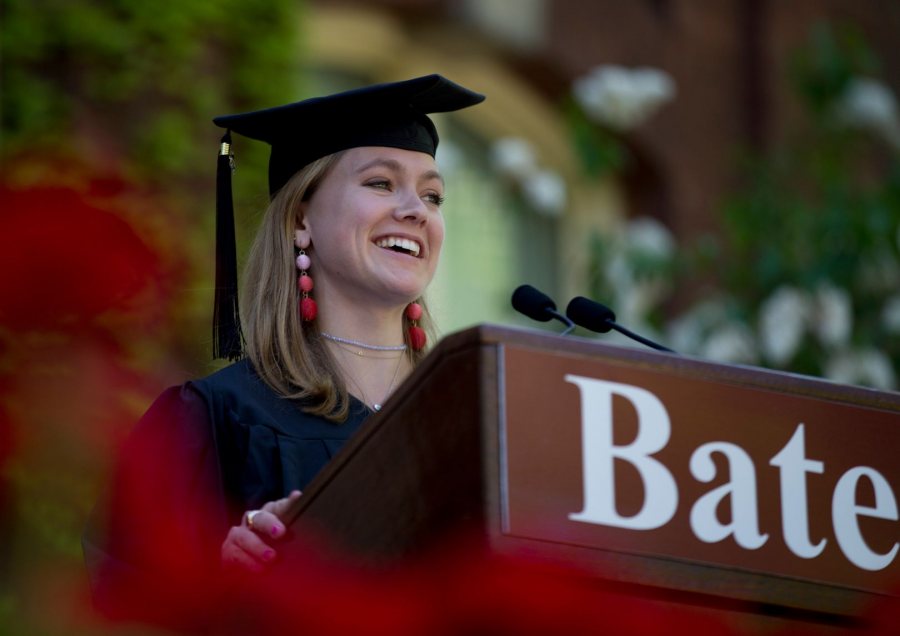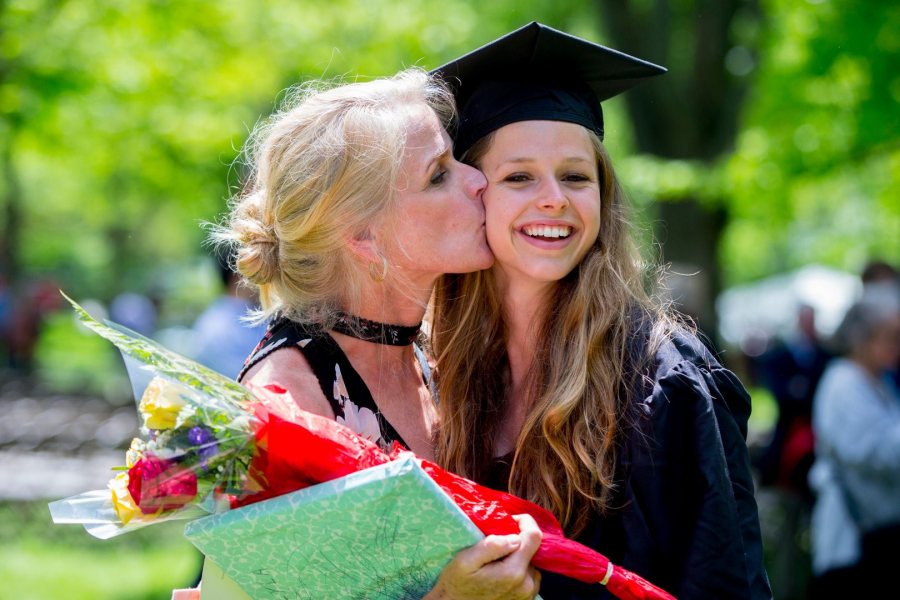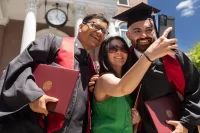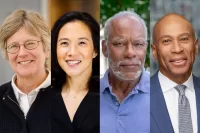
“My time is running out and there is so much to do,” Harlem Children’s Zone President Geoffrey Canada told the Bates Class of 2017 on May 28.
“I wish I could stand before you today and say that my generation is leaving you a country that is better than the one we inherited from our parents,” Canada said. “We haven’t kept my promise to eliminate those places where our children don’t have a chance. America’s children are more imperiled than ever.”
As it happened
The complete livestream of Commencement 2017 at Bates.
But ultimately, Bates’ 2017 Commencement speaker continued, he’s not worried. “The work we don’t complete that attempts to make this a better country, the next generation will finish it.” And that next generation is you, Canada told the 458 graduating seniors.
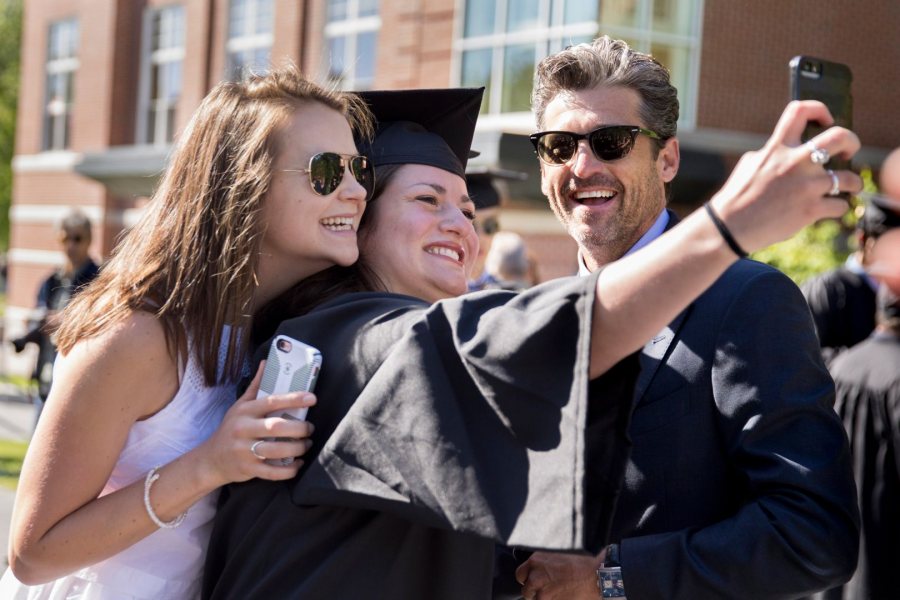
Kate Berger ’17 (center) and classmate Sadie James take a selfie with actor and Bates honorand Patrick Dempsey as graduates line up on Alumni Walk. Berger, whose twin sister heard a former vice president speak at Colby College’s graduation last week, commented, “This beats Joe Biden.” (Phyllis Graber Jensen)
Described as the “guiding light of the Harlem Children’s Zone,” a comprehensive community program that has supported the educational aspirations of thousands of families, Canada was one of four honorary degree recipients at Bates’ 151st Commencement.
The others were Wanda Corn ’62, one of the most prominent U.S. art historians; Patrick Dempsey, known for both his acting (Grey’s Anatomy) and his philanthropic work with Lewiston’s Dempsey Center; and Susan Collins, Maine’s senior U.S. senator and a politician celebrated as one of the Senate’s last practitioners of bipartisanship.
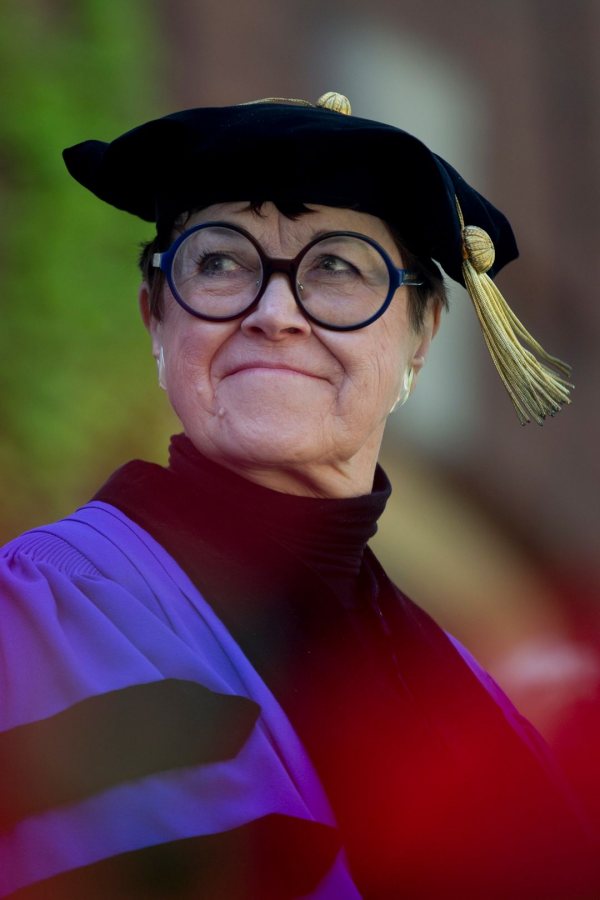
Wanda Corn ’62, one of the leading U.S. art historians, was one of four honorary degree recipients at Commencement 2017. (Phyllis Graber Jensen/Bates College)
Under sun and blue skies, Bates President Clayton Spencer welcomed a huge Commencement crowd on what she called “the most glorious Commencement day I have ever seen, which is fitting for the fabulous Class of 2017.”
Spencer wowed the crowd with a few statistics describing, in various ways, what she described as a remarkably accomplished group. “One in seven of you are the first in your family to graduate from college,” she noted to applause. Thirty-three earned departmental honors. One hundred and ten were double majors, and three were triple majors.
Spencer went on to spotlight the class’s community engagement (80,000 hours’ worth, all told); a stellar athletics record updated just one day before Commencement with the women rowers‘ second NCAA Championship in three years; and the 15 seniors who, along with six alumni, have received 2017 Fulbright fellowships.
“I have had the pleasure of getting to know many of you over the past four years,” the president continued. “And what I am most proud of is not these impressive facts and figures but the human qualities you embody: your creativity, your generosity, your drive for justice, your wackiness, and your joy in, and caring for, one another.”
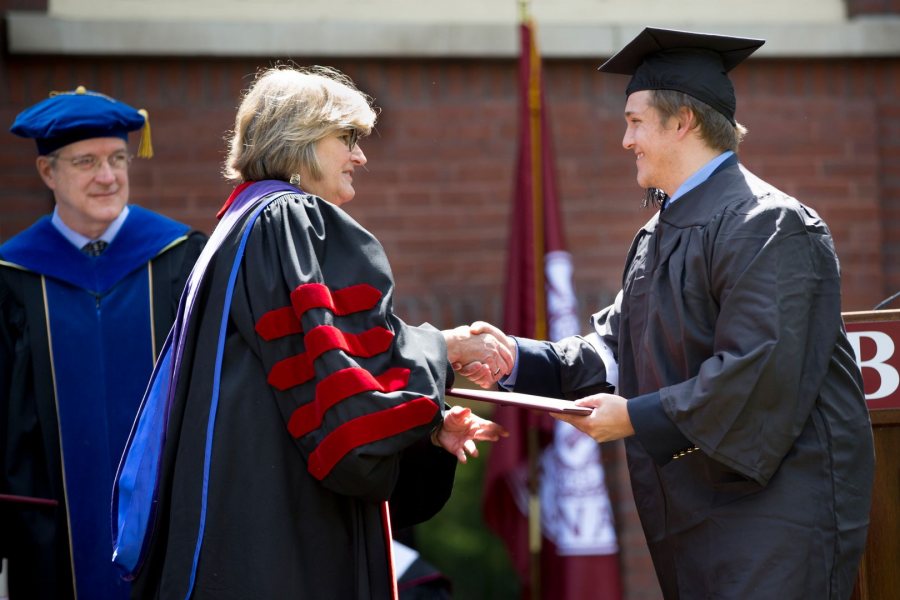
President Clayton Spencer awards Cormac Walsh ’17 of Biddeford, Maine, a bachelor of science degree in biological chemistry. (Phyllis Graber Jensen/Bates College)
Giving the Senior Address was Molly Chisholm, of Boston, a double major in economics and rhetoric. She resurrected a concept from a bygone era and gave it new meaning in the context of the graduating class.
“A few years ago, I heard someone use the phrase ‘the Love Generation,'” she said, “and I was struck by the bold beauty of such simple words. ‘The Love Generation’ — an age of human beings willing to set aside their differences, ready to fill the world with acceptance rather than fear, with love rather than hate.”
She said, “Even though I grew up around people who always believed in making the world a better place, it wasn’t until I arrived at Bates that I understood what that truly meant and how it could actually happen.”
Chisholm told two stories — “teaching moments,” in her words — that bookended her Bates experience. One was about a prank played on her, during an AESOP experience, that struck her first as simply “cringe-worthy.” But as her time at Bates went on, “it became obvious from that interaction that Bates was a place where kindness was expected.”
In the fall of her senior year, Chisholm ran as the Republican candidate in a mock campaign for the White House, undertaken as part of a rhetoric course. Politically progressive, Chisholm was obliged to advance positions contrary to her own.
Amidst a national political environment that was anything but hopeful, “I saw a glimmer of hope in our mock election. Instead of choosing to shut me down, people often asked me to explain my ideas and reasoning, said Chisholm. “They exhibited the respect and intellectually courageous mindset that is inherent in Bates students.
“As Bates students, we have had the opportunity to live in a world where respect and kindness are not just something we strive for, but they are the pillars of our community. We graduate today with more than just the knowledge we need to succeed in our future endeavors, but with the power to truly make the world a better place.”
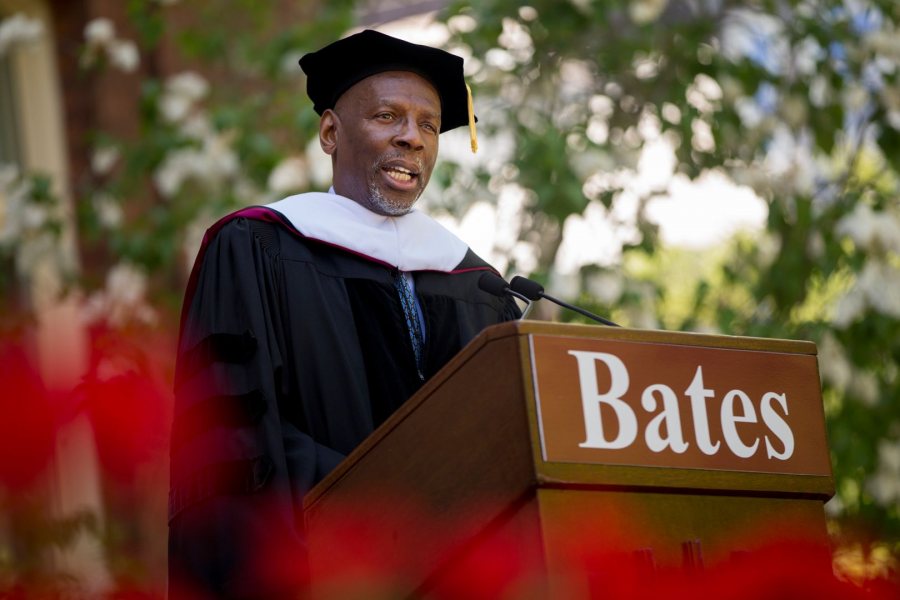
Described as the “guiding light of the Harlem Children’s Zone,” Geoffrey Canada gave the keynote address at Commencement 2017. (Phyllis Graber Jensen/Bates College)
Seemingly picking up from Chisholm the theme of making things better in the world, Canada showed the graduating class their place in the great cycle of social progress.
He started his talk on a light note. “Some institutions have a reputation so stellar that just saying you received a degree from there makes people think you are really smart. Bates College is such an institution.
“And if by some means you have managed to graduate from here and you are not really smart, please try to keep that hidden from the public. Your classmates and alma mater will appreciate it.”
More seriously, Canada described how role models like Rosa Parks, John Kennedy, Robert Kennedy, Martin Luther King Jr. — and Canada’s mother — inspired him to emerge from the impoverished South Bronx and thrive. But not only that: They inspired him to “challenge America to become a better place for its children.”
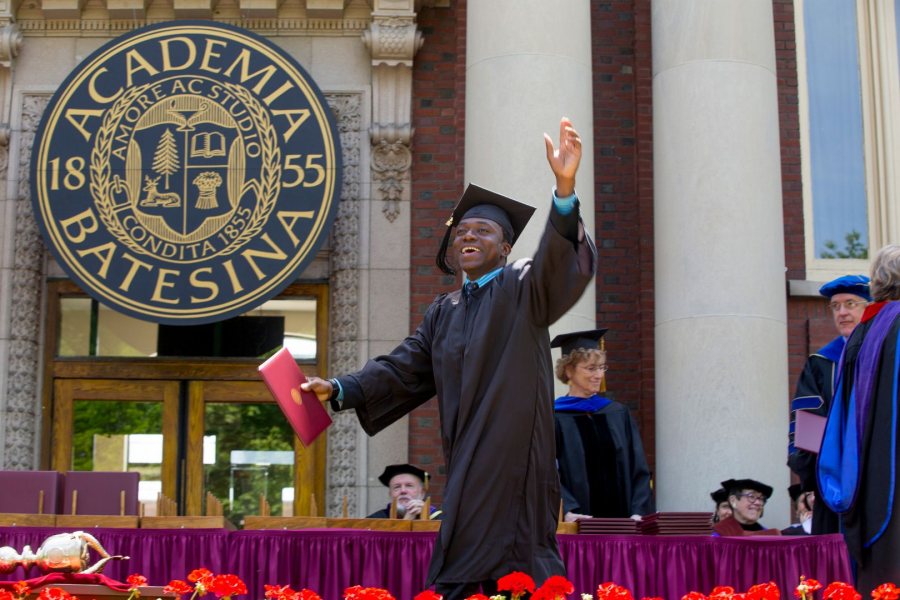
Gideon Ikpekaogu ’17 of Amsterdam, the Netherlands, leaves the stage after receiving his bachelor’s degree in economics. (Phyllis Graber Jensen/Bates College)
“I have always been deeply moved by the sacrifices that others made to make our country the greatest nation on earth,” Canada said.
“Our country was created, molded, and improved by men and women whose moral compass was not moved by the influence of wealth, prestige, and notoriety. They believed that America stood as a beacon for the world on what true freedom, true democracy meant. These leaders became my role models.”
People like King and the Kennedys, lost to assassins, had “everything to lose — money, fame, loving families,” Canada said. And they “lost it all for the ideals that this country stood for. Who could not feel obligated to continue their work, to ensure their deaths would not be in vain?”
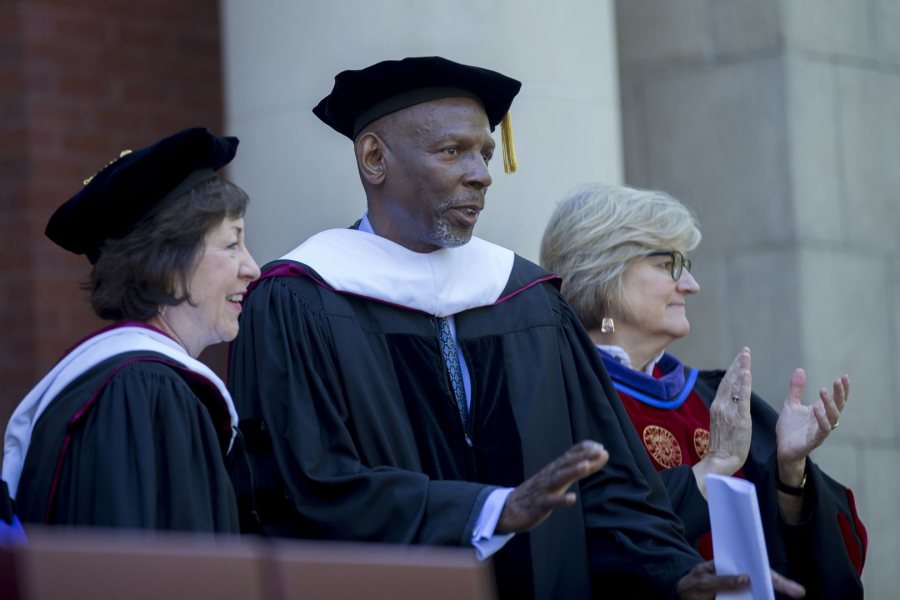
Maine’s senior U.S. senator, Republican Susan Collins, joins Bates President Clayton Spencer in applauding education visionary Jeffrey Canada as he acknowledges applause after his keynote address. (Phyllis Graber Jensen/Bates College)
Through the work he has done with the Harlem Children’s Zone, Canada said, “I hope I can set an example that inspires America to save all children.” And it’s up to people like the Bates Class of 2017 to act on that inspiration.
While Canada’s own achievement through the HCZ has been tremendous, he allowed that by and large, his cohort has fallen short as successors to the “Greatest Generation” that fought World War II. “While my generation has done real good and made real progress, we have also left you a real mess,” from environmental degradation to persistent poverty and social injustice.
And now, because the work of uplifting the world can’t be done all at once, it’s time for Canada’s generation to pass the torch to a younger one — a concept the speaker conveyed movingly with a reading from the “Mountaintop” speech that King made in Memphis the night before he was assassinated.
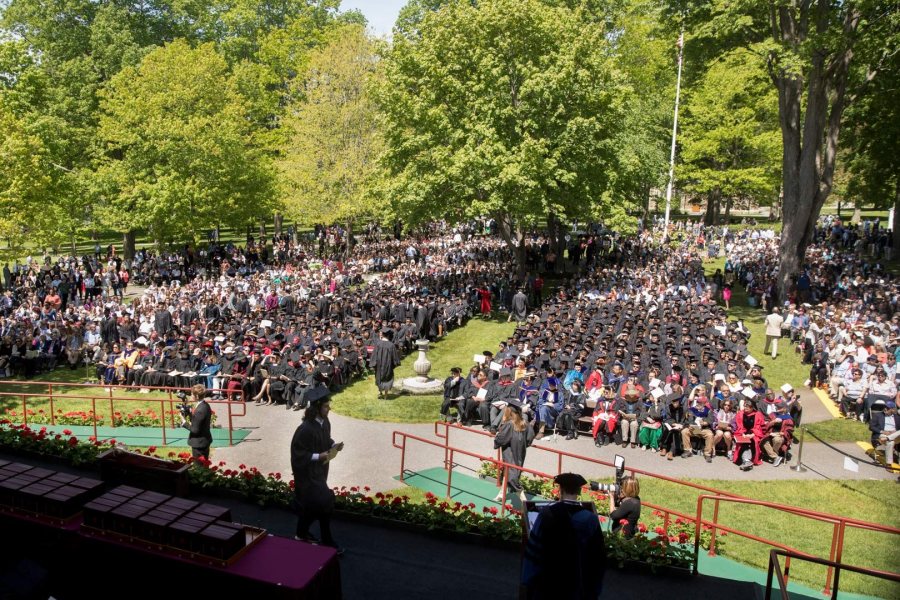
The Commencement 2017 gathering seen from an upper floor of Coram Library. For the first time in years, bleachers weren’t used for Commencement seating. (Phyllis Graber Jensen/Bates College)
Canada told the seniors, “I’m not worried about my promise, because let me tell you what else my role models taught me: The best of America is yet to come.”
Rounding out Bates’ 151st Commencement was the annual welcome to the Alumni Association, extended by association president Lisa Romeo ’88; and the announcement of the Class of 2017 gift.
Matt Phillips and Susan Leonard, senior gift co-chairs, were pleased to announce that the class had donated $4,805 to college. With 345 members kicking in, the gift drive attained its goal of 75 percent participation.
Just prior to a rocking sendoff propelled by the Atlantic Clarion Steel Band, Multifaith Chaplain Brittany Lonsgdorf offered the customary benediction, which concluded:
“May each dawn be a wellspring of renewal, and may each dusk be a calm pool of contentment. Go forth into uncharted waters and find your sails full and your bright eyes focused on a new horizon.”
